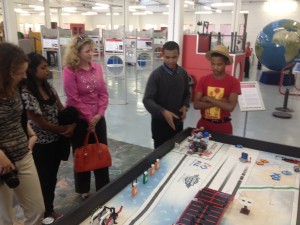As Africa emerges as the latest continent to experience vigorous economic growth, the demand for science and engineering education is clearly obvious. One should not generalize a continent with over 50 countries, but one truth about Africa is that the desire for education far outstretches the opportunities available throughout the region. Many global organizations including UNESCO are striving to ensure education remains high on the agenda of governments throughout the region.

The challenges confronting Africa are analogous to what countries in the Middle East face–long term success means enough locals have got to be skilled in fields such as mathematics, engineering or the physical sciences. But the difference in the Middle East is that for now the wealthier countries can import scientists and engineers as a temporary measure–as well as the professors who can transfer such skills and knowledge. Africa does not have that option.
So the ability to spark interest in the sciences has got to start at home. One up-and-coming science museum in Cape Town aims to spark interest among local youth who eventually can help build South Africa’s, and the continent’s, capacity in the sciences.
The Cape Town Science Centre and Observatory opened its doors in late 2000. At first the centre was located in the city’s Canal Walk shopping district, but the museum faced a huge challenge: the lack of convenient public transportation meant it was inaccessible to most students within the greater Cape Town area. In December 2010 the centre reopened to a more convenient part of town for most of the city’s residents.
Led by the tireless Julie Cleverdon, the Cape Town Science Centre serves as a locus for science education and awareness. Like other science museums, the centre is a hands-on experience for children, with a bevy of exhibits and activities from the “world’s largest cellular phone” to learning about construction materials in a mock building site exhibit. Our visit two weeks ago included a demonstration of a robotics project by one team that placed highly in a local competition. The centre also serves as a sustainability lab: the facility harvests rainwater for use onsite and eventually will score most of its energy from solar panels.
The centre receives support from a variety of organizations in the private and public sectors. MTN, one of Africa’s largest telecommunications firms, has long been a sponsor. SAP Africa is another benefactor, and also funds education programs throughout the year. SAP also supports a program that builds skills for mentors and coaches from disadvantaged communities, and also provides employee volunteers to work at the centre. The company also supports similar science centers in Johannesburg and Durban.
For companies such as SAP and MTN, supporting educational programs and facilities such as the Cape Town Science Centre is not just about philanthropy and community engagement. Such investment is also smart long term business. Companies will continue to need professionals with the latest technical skills and are best served if they can hire qualified applicants locally. And based on the enthusiasm I saw amongst the staff and students visiting that autumn day, keen interest in the sciences in Cape Town and across South Africa is well on its way.





